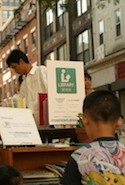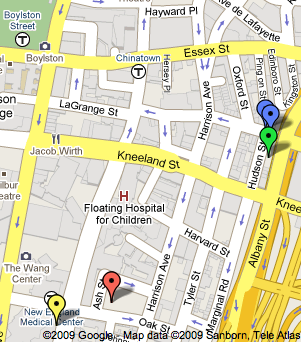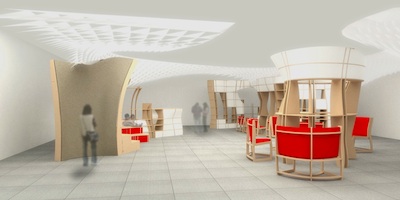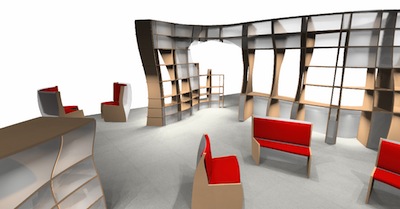ABOUT THE PROJECT

The Chinatown Storefront Library transformed one of Boston Chinatown’s vacant, commercial, street-level spaces into a temporary public library. Operating from October 2009 through January 2010, the project created a memorable event for Chinatown, while providing a selection of urgently needed services for a community that has been without a library since 1956. The library offered: books, Internet access, newspapers, a children’s reading area, and a mix of programs and activities—all visible to passersby on the street.
å”人街店é¢å›¾ä¹¦é¦†é¡¹ç›®å°†ä¸€ä¸ªç©ºç½®çš„店é¢å•ä½å˜æˆäº†ä¸€æ‰€æš‚时性的图书馆。虽然è¥ä¸šæ—¶é—´åªæœ‰ä¸‰ä¸ªå¤šæœˆï¼Œæœ¬é¦†å·²åœ¨å”人街居民心目ä¸å·²ç•™ä¸‹æ·±åˆ»çš„å°è±¡ã€‚æœ¬é¦†çš„å¼€è®¾æ‰“ç ´äº†å”人街地区50å¹´æ¥æ²¡æœ‰ä»»ä½•å›¾ä¹¦é¦†çš„å±€é¢ï¼Œå°†è¿™ä¸ªå…³é”®çš„设施带回了本地区。本馆的æœåŠ¡åŒ…括图书借出,æ‚志阅览,电脑上网,åŠå„类文娱活动。为æœåŠ¡å¹´è½»è¯»è€…,本馆还切有儿童图书角。
The Storefront Library is not a branch of the Boston Public Library, nor is it intended to be a substitute for a permanent branch. The project’s purpose is to use a vacant storefront to demonstrate the potential impact of a library in the neighborhood. It also models how communities can move forward in tough economic times to activate urban space.
本馆åªæ˜¯ä¸€ä¸ªæš‚æ—¶æ€§çš„ç ”ç©¶é¡¹ç›®ï¼Œä¸Žæ³¢å£«é¡¿çš„å›¾ä¹¦é¦†ç³»ç»Ÿæ²¡æœ‰å…³è”。本馆的è¥ä¸šç›®çš„有两个:第一,我们想用行动è¯æ˜Žå›¾ä¹¦é¦†å¯¹è¿™ä¸ªåœ°åŒºçš„é‡è¦æ€§ã€‚第二,我们想示范在ç»æµŽå›°å¢ƒä¸‹å¦‚何更有效利用城市空间æ¥å¢žè¿›å¸‚民利益。
PROGRAM
Taking cues from a 2008 Library Program and Siting Study, and integrating recommendations from partners at the Boston Public Library and Simmons Graduate School of Library and Information Sciences, the Storefront Library offers:
- a collection of books for children and adults, chosen specifically for the community,
- newspapers and magazines,
- Internet access on desk-mounted computers and via WiFi,
- areas for homework or private laptop use,
- children’s area (read aloud, story hour, picture books),
- a physical and electronic community bulletin board.

The Storefront Library also offers a variety of events in a highly-visible street-level location. Programming partners, from the US Census to local arts and community groups, are offering programs in the space, as a way to highlight their work and show support for this temporary cultural and civic use of vacant space.
The anticipated audience for the Storefront Library includes:
- elderly and adults with young children from Chinatown,
- Visitors interested in readings, screenings and programs,
- Visitors interested in the library’s design and program.
COMMUNITY OUTREACH
 In the summer of 2009, Boston Street Lab created a mobile preview of the Storefront Library at local events in downtown Boston. Library staff were on-hand to discuss the project and provide a children’s reading area, photography and calligraphy books for browsing, and free WIFI.
In the summer of 2009, Boston Street Lab created a mobile preview of the Storefront Library at local events in downtown Boston. Library staff were on-hand to discuss the project and provide a children’s reading area, photography and calligraphy books for browsing, and free WIFI.
![]()
On May 14, June 11, and July 9, 2009, the Storefront Library Project presented at meetings of The Chinatown Coalition.
![]()
On July 12, 2009, the Storefront Library (mobile) appeared at the Chinatown Main Street Festival. Slideshow available in the Multimedia Player, at right.
![]()
On August 5, 2009, the Storefront Library Project was presented at a meeting of the Chinatown Residents Association held at the Josiah Quincy School.
![]()
On Sunday, August 16, 2009, the Storefront Library (mobile) appeared at the 2009 August Moon Festival in Chinatown.
![]()
From August 27-30, 2009, the Storefront Library (mobile) visited Films at the Gate, a free, outdoor chinese-language film series held on a vacant lot near the Chinatown Gate.

DESIGN
The Storefront Library is a unique opportunity to model and test how the physical elements of a branch library can be designed to best serve aspects of a library program. Students and architects from Harvard’s Graduate School of Design (GSD), led by The Department of Micro-Urbanism, designed unique, visually and tactilely engaging furnishings that anticipated the needs of Chinatown residents. The students were independently responsible for a design called INSERT, for which they organized, raised funding, obtained in-kind material donations, designed, fabricated, and installed.


HISTORY

The Chinatown neighborhood of Boston has been without a branch of the Boston Public Library since 1956, when the library was closed and demolished to make way for the construction of the Central Artery. Chinatown has remained one of the few communities in Boston without its own neighborhood branch library, in spite of strong community support. Chinatown is primarily a pedestrian community, with many elderly residents and working parents with children. Traveling to other libraries is difficult, and there is no other street-level space offering the services typically found in a neighborhood branch.
In 2001, the Chinese Youth Initiative of the Chinese Progressive Association started a campaign to bring a library back to Chinatown. This led to the creation of a broad-based advocacy group called Friends of the Chinatown Library. In 2007, the City of Boston commissioned the Chinatown Library Program and Siting Study which determined the program and sites preferred by the community. Since the study’s completion date in June 2008, the economic picture for all City-initiated projects has darkened, and there are no current plans (or funding) for moving forward on any of the study’s conclusions.
DOCUMENTS
![]()
- Storefront Library Mini Poster
(bilingual, PDF, 452K, 2009.11.08)
- Storefront Library Bookmark
(bilingual, PDF, 520K, 2009.11.08)
Storefront Library Seeking Program Partners
(PDF, 350K, 2009.08.25)
Storefront Library Seeking Sponsors
(PDF, 350K, 2009.08.25)
For best results, right-click (control-click) the links above and save PDFs to your computer.
WHO
The Storefront Library was produced by Boston Street Lab. Contact project staff here.
SPACE PARTNER
- Archstone (donated commercial space)
DESIGN, FABRICATION & INSTALLATION OF LIBRARY FURNISHINGS
PROJECT ADVISORS
- Asian Pacific American Librarians Association
- Boston Public Library
- Friends of the Chinatown Library
- Nate Hill (Brooklyn Public Library)
- Quincy Elementary School Library
- Simmons Grad. School of Library and Information Sciences
PROGRAMMING PARTNERS
- Phil Amara
- ArtGarden
- Asian American Studies Program at University of Massachusetts, Boston
- Asian American Resource Workshop
- Asian American Civic Association
- Asian Community Development Corporation—HDOD Project
- Asian Sisters Participating in Reaching Excellence
- Asian Task Force Against Domestic Violence
- Bay State College
- Be The Match
- City of Boston, Talk Read Play
- Boston Children’s Museum
- Boston Chinatown Neighborhood Center
- Boston Nature Center/Mass Audubon
- Boston Public Health Commission
- Boston Public Library
- Beatrice Chen
- Chinese Historical Society of New England
- Chinese Progressive Association
- Common Boston
- Drawing Lab, Deb Putnoi
- Jasper Goldman
- Grub Street
- Hep B Initiative
- Home Movie Day
- David Jenkins
- Jean Lukitsh, Films at the Gate
- Opera Boston
- Papercut Zine Library
- READ Boston
- Greg Tang
- Woo Ching White Crane
PROGRAM MANAGER
LIBRARY ASSISTANT
- Shujuan Yu
LIBRARY INTERNS
- Matt Amory (Simmons GSLIS ’10)
- Fran Keenan (Simmons GSLIS ’10)
- Laura Jean Miller (Simmons GSLIS ’08)
- Adam Robinson (Simmons GSLIS ’10)
LIBRARY VOLUNTEERS
- Devin Ashe
- Brianna Belanger (Simmons GSLIS ’11)
- Lucy Borgheiinck (Simmons GSLIS ’11)
- Jing Cao
- Kwan Cheung
- Amalia Child (Simmons GSLIS ’11)
- Jewel Chin
- Susan Chin
- Michael Ho
- Tony Huang
- Julie Lam
- Rebecca Lee
- Cara Lei
- Cindy Li
- Heather Maclean
- Astrid Müller
- Patrick Murphy (Simmons GSLIS ’10)
- June Ng
- Hope Nguyen
- Jane Polson (Simmons GSLIS ’11)
- Sarah Price
- Jerry Russo
- Melissa Saggerer (Simmons GSLIS ’10)
- Amy Sloper
- Sharon Tomasulo (Simmons GSLIS)
- Dat Tran
- Phoenix Wang
- Maria Wong
- Valerie Wong
- Annie Wu
- Emily Wu
- Cynthia Yee
- Shirley Yu
- Maple Zou
RECENT COMMENTS